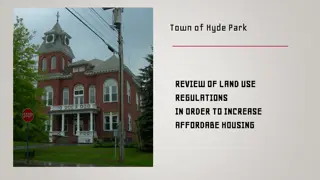Characters in Robert Louis Stevenson's "Strange Case of Dr. Jekyll and Mr. Hyde
Explore the key characters in Robert Louis Stevenson's classic novel "Strange Case of Dr. Jekyll and Mr. Hyde," including Mr. Utterson, Richard Enfield, Dr. Lanyon, Dr. Henry Jekyll, and Edward Hyde. Witness their intertwined fates and the dark truths they reveal about the duality of human nature.
Download Presentation

Please find below an Image/Link to download the presentation.
The content on the website is provided AS IS for your information and personal use only. It may not be sold, licensed, or shared on other websites without obtaining consent from the author.If you encounter any issues during the download, it is possible that the publisher has removed the file from their server.
You are allowed to download the files provided on this website for personal or commercial use, subject to the condition that they are used lawfully. All files are the property of their respective owners.
The content on the website is provided AS IS for your information and personal use only. It may not be sold, licensed, or shared on other websites without obtaining consent from the author.
E N D
Presentation Transcript
Mr. Utterson The narrator of the book, Utterson is a middle-aged lawyer, and a man in which all the characters confide throughout the novel. As an old friend of Jekyll, he recognizes the changes and strange occurrences of Jekyll and Hyde, and resolves to further investigate the relationship between the two men. He is perhaps the most circumspect, respected, and rational character in the book, and it is therefore significant that we view Hyde's crimes and Jekyll's hypocrisy through his observant, but generally sympathetic perspective.
Richard Enfield Mr. Utterson's cousin, a younger man who is assumed to be slightly more wild than his respectable and sedate relative. While initially it is assumed that Enfield will play a large role in this novel as it is he who is witnesses Hyde's initial crime, Enfield only appears in two scenes. In both, he walks past Hyde's mysterious door with Mr. Utterson.
Dr. Lanyon A former friend and colleague of Dr. Jekyll. Ten years before the events in the novel, he suspended his friendship with Dr. Jekyll because of a disagreement over scientific endeavors. Lanyon is highly respected, rational, and values truth and goodness above all else.
Dr. Henry Jekyll A prominent middle-aged doctor described as both tall and handsome. He is also extremely wealthy with a fortune well over two million dollars. All that know him describe him as respected and proper. However, as the novel progresses, we subtly witness his hypocritical behavior, which Stevenson claimed was Jekyll's fatal flaw. The doctor's belief that within each human being there exist forces of good and evil leads to his experiments that try to separate the two. Although presented as a scientific experiment, Jekyll undertook this task to allow himself a release from the respectable guise of Dr. Jekyll. In the book, Jekyll's voice is only heard in the concluding chapter, only after being described through the lens of Utterson, Lanyon, Poole, and Enfield.
Edward Hyde A small, deformed, disgusting man somewhat younger than Dr. Jekyll who is apparently devoid of a profession. Lanyon, Utterson and Enfield all describe witnessing something indefinably evil and horrific in Edward Hyde's face. He is often compared to animals, implying that he is not a fully evolved human being. Despite these descriptions, Hyde is generally civilized in his interactions with others, most notably Utterson and Lanyon. Dr. Jekyll describes Hyde as "pure evil," who menaces society at night, trampling a girl in the street and murdering Sir Danvers Carew. We learn at the end of the story that Edward Hyde and Dr. Henry Jekyll are in fact the same person.
CHAPTER ONE We re introduced to Mr. Utterson who, despite being rather dry and boring, is a good friend and good-natured man. We re introduced to his friend and relative, Mr. Enfield. The two of them take long, slightly mysterious walks every Sunday. One Sunday they walk past a door, which prompts Mr. Enfield to tell a story. Naturally. Mr. Enfield s story goes like this: Early in the morning, he sees a man trample over a little girl. Mr. Enfield corners the man. The man is evil-looking and deformed. The entire crowd wants to kill the man, who responds with something along the lines of "I ll give you lots of money if you don t kill me." He disappears inside and emerges with a "cheque" for almost a hundred pounds, drawn from the bank account of a well-respected man. Mr. Enfield speculates that the evil man is blackmailing the well-respected man. Mr. Enfield says that he calls the place with the door "Black Mail House." The two men then speculate about the door, and Mr. Enfield finally says that his policy on odd events is not to ask any questions of any kind.
CHAPTER TWO Mr. Utterson goes home, and instead of his usual evening routine, he goes to a safe and takes out a set of documents. The documents decree that if Dr. Jekyll is to die or disappear in any way, his entire estate is to be passed over to Mr. Hyde. Mr. Utterson seems to think that something is rotten in the estate of Dr. Jekyll. Utterson decides to go hang out with his good friend, Dr. Lanyon. Turns out Dr. Jekyll, Dr. Lanyon, and Mr. Utterson were once good friends. It also turns out that Dr. Lanyon and Dr. Jekyll have had a huge argument about science. Mr. Utterson asks if Dr. Lanyon has heard of Mr. Hyde. The answer is no. That night, Mr. Utterson can t sleep. He dreams crazy dreams about Mr. Hyde and speculates about the evil man s hold over Dr. Jekyll. Mr. Utterson basically starts stalking the door to Black Mail House in an effort to catch Mr. Hyde. The two finally meet, and Mr. Utterson is totally repulsed by Mr. Hyde s terrible manners and appearance.
CHAPTER THREE Two weeks later, Dr. Jekyll gives a dinner party for five or six old men. Mr. Utterson is the guest who deliberately stays later than everyone else. He asks about Mr. Hyde and the strange will. Dr. Jekyll begs Mr. Utterson to let the issue drop, saying that he s taken an interest in Mr. Hyde. And that s that. It s all very mysterious.
CHAPTER FOUR Almost a year later, everyone in London is shocked by a terrible crime. A maid saw everything. Her testimony ran as follows: She was sitting in her window and saw a sweet and gentle and kind old gentleman asking a young man for directions. She recognized the young man as Mr. Hyde. Suddenly, Mr. Hyde beat the old gentleman to death. The maid fainted. Hours later, she finally called the police. The old man has a letter on him addressed to Mr. Utterson. Mr. Utterson (who seems to be everybody s lawyer) accompanies a police officer to the crime scene. He recognizes the body as Sir Danvers Carew and the broken walking stick (read: murder weapon) as one that he had given to Dr. Jekyll some years before. Mr. Utterson offers to take the police officers to Dr. Jekyll s house, where they poke through everything but are unable to find Mr. Hyde.
CHAPTER FIVE Mr. Utterson goes to visit Dr. Jekyll, who looks extremely sick. Mr. Utterson asks if Dr. Jekyll is harboring Mr. Hyde, and Dr. Jekyll swears that he will never see or contact Mr. Hyde again. Dr. Jekyll gives Mr. Utterson a letter written by Mr. Hyde. Mr. Utterson shares it with his head clerk, Mr. Guest, who just happens to be a handwriting expert. A messenger happens to deliver an invitation written by Dr. Jekyll. Mr. Guest declares that the two pieces of writing were written by the same hand. Mr. Utterson goes to bed very disturbed, convinced that Dr. Jekyll forged the letter from Mr. Hyde.
CHAPTER SIX Despite a massive manhunt, Mr. Hyde is nowhere to be found. Dr. Jekyll becomes well and happy, throwing dinner parties and engaging in charitable works. Mr. Utterson dines with Dr. Jekyll and Mr. Lanyon on the 8th of the month and all is well, but on the 12th, 14th, and 15th he is denied admittance to the doctor s house, on the grounds that Dr. Jekyll is ill. Mr. Utterson calls on Mr. Lanyon, who looks near death. So both Dr. Jekyll and Mr. Lanyon are ill. Mr. Lanyon claims that his friendship with Dr. Jekyll is over. Mr. Utterson writes to Dr. Jekyll, who replies with a similar message. A week later, Mr. Lanyon, confined to his bed, dies. In the spirit of the novel and its mysterious documents, Mr. Lanyon left Mr. Utterson with an envelope before he died. Upon opening it, Mr. Utterson finds yet another envelope. This one is not to be opened until the death or disappearance of Dr. Jekyll. Mr. Utterson is totally tempted to open up this mysterious envelope, but he resists. Mr. Utterson longs for the company of his old friend, Dr. Jekyll, but on every visit the servants say that Dr. Jekyll has shut himself up in his laboratory. Mr. Utterson finally begins to suspect that Dr. Jekyll himself has engaged in some evil doings.
CHAPTER SEVEN Mr. Utterson, on his weekly walk with Mr. Enfield, passes by the door that started this whole novel. (That would be the Black Mail Door remember?) It turns out that the door is a back way to Dr. Jekyll s house. The two friends step into the courtyard with all the windows, and chance to see Dr. Jekyll at the window, looking sickly and pale. They chat briefly before Dr. Jekyll completely freaks out, slamming the window and scaring Mr. Utterson and Mr. Enfield.
CHAPTER EIGHT Dr. Jekyll s manservant, named Poole, shows up at Mr. Utterson s door, convinced that something terrible has befallen his master. He convinces Mr. Utterson to accompany him back to Dr. Jekyll s house. They arrive at the house, where all the servants are collectively freaking out. Poole announces Mr. Utterson s presence. Dr. Jekyll refuses to see his old friend. Same old song and dance. Based on the voice coming from behind the door, Poole is convinced that the man in the room is not Dr. Jekyll. Poole and Mr. Utterson chat about the events of the past week. Dr. Jekyll, or whoever is inhabiting the room in the laboratory, has been issuing chemical orders via slips of paper. He hasn t been able to obtain whatever it is that he s looking for. Poole is convinced that the man inside the room is really Mr. Hyde. Using an axe and a kitchen poker, Poole and Mr. Utterson break into the room. Inside the room, everything is very neat and clean and in perfect order. Except for the body of a man lying on the floor and "twitching." It s Mr. Hyde. He has committed suicide. The two men search the area, looking for Dr. Jekyll. Mr. Utterson finds a will naming him as the heir to Dr. Jekyll s estate. Mr. Utterson, in a seemingly endless tirade of paper discovery, finds yet two more documents. The first instructs him to read Dr. Lanyon s narrative, and the second is a narrative written by Dr. Jekyll.
CHAPTER NINE Dr. Lanyon receives a letter from Dr. Jekyll asking him, in the name of their long and esteemed friendship, to perform a complicated favor. The favor involves breaking and entering into Dr. Jekyll s laboratory and giving some potions to a messenger who will arrive at Dr. Lanyon s house at midnight. Dr. Lanyon does as the letter requests. Mr. Hyde shows up, eager to take the chemicals. He s wearing clothes that are much too big for him. He takes the chemicals and transforms into Dr. Henry Jekyll. This is quite a disturbing sight, especially for a man of science such as Dr. Lanyon.
CHAPTER NINE CHAPTER TEN Dr. Jekyll starts his letter by explaining the two sides of his character: on the one hand, he loves being sober, dignified, and respectable, yet on the other hand he craves pleasure and debauchery. In his research, he discovers how to split these two natures into two men. He takes a potion and immediately feels both extreme pleasure and extreme wickedness. This wickedness is accompanied by a transformation into Mr. Edward Hyde. He takes the potion and transforms back into Dr. Jekyll. He therefore does not succeed in creating someone wholly good and someone wholly evil, but rather himself and a wholly evil version of himself.
CHAPTER NINE He makes various arrangements for his new self: a house, a housekeeper, a new will, etc. You need stomping grounds for the evil version of yourself. Then he goes nuts as Edward Hyde unfortunately, he gives us no descriptions beyond "wickedness." His conscience doesn't trouble him, because as Dr. Jekyll, he continues being respectable. When he knocks over the child as Mr. Hyde, he has to use Dr. Jekyll s bank account to not get killed by the angry mob. Soon after, he opens a bank account in Mr. Hyde s name. Two months before the murder of Sir Danvers Carew, Dr. Jekyll wakes up one morning as Mr. Hyde. This is disconcerting, to say the least, and Dr. Jekyll begins to feel that he has to make a choice between his two personas. For the next two months, he lives a respectable life as Dr. Jekyll. But he longs to become Mr. Hyde again. So one evening, he takes the transformative potion.
CHAPTER NINE Then he beats Sir Danvers Carew to death. Horrified, he breaks the key to his laboratory and potions, and resumes a sober life as Dr. Jekyll. But the secret urges remain and one day, sitting in the park, his thoughts grow evil and he transforms into Mr. Hyde. Away from his potions, and wearing the face of a wanted murderer, Dr. Jekyll sends a note to Dr. Lanyon with specific instructions. It works: Mr. Hyde transforms back into Dr. Jekyll, but Dr. Lanyon s friendship is lost forever. But all is not solved. One day later, Dr. Jekyll is walking in his courtyard and transforms again into Mr. Hyde. He runs into his laboratory, but it takes a double dose to restore himself to the appearance and personality of Dr. Jekyll. Six hours later, he again transforms. Dr. Jekyll rapidly gets sicker and sicker, and Mr. Hyde grows more powerful and more insistent.
CHAPTER NINE Then he runs out of potions. Panicking, he sends his servants all around London looking for a specific kind of salt. None of the salts work, convincing Dr. Jekyll that there must have been some unknown impurity in the first sample that lent the potion its efficacy. He ends his letter by saying Dr. Jekyll has most certainly died, and he can only speculate on what will happen to Mr. Hyde. He says he is bringing "the life of that unhappy Henry Jekyll to an end," but we never really know if Jekyll killed himself (and Hyde) before Hyde took over, or whether Hyde, for some unknown reason, killed himself.
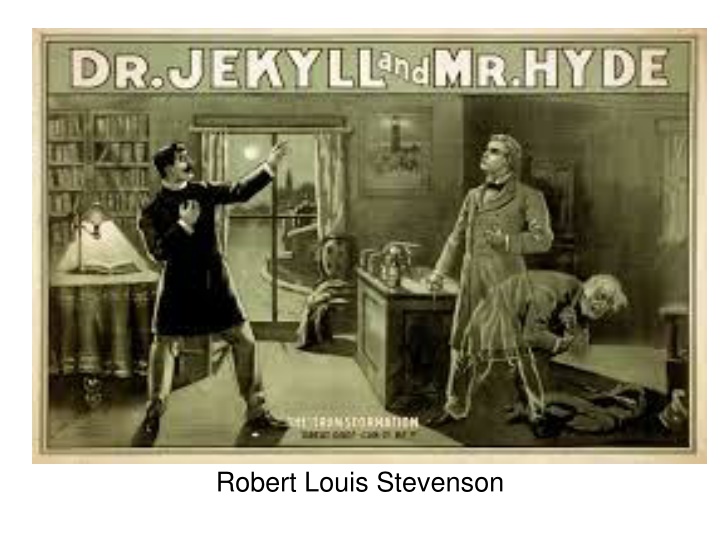



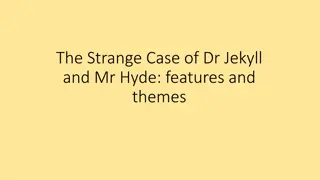

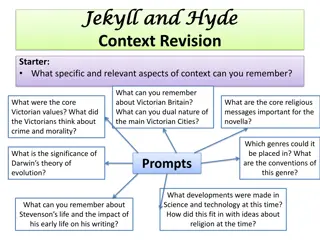

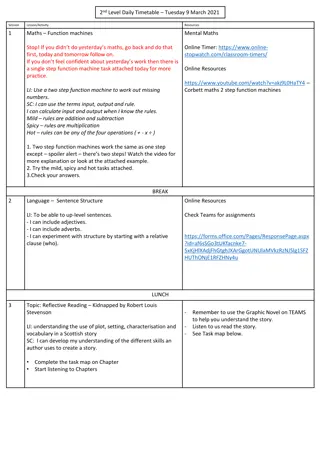
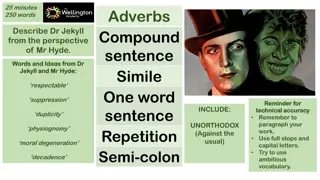

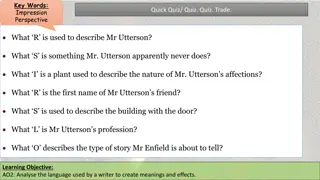
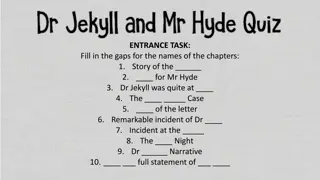
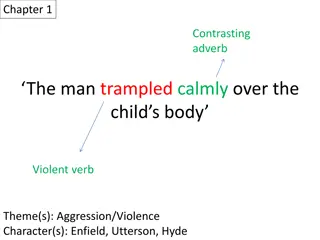
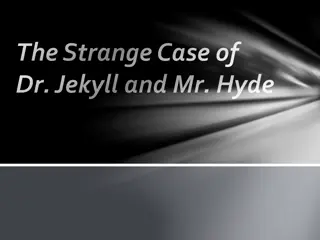
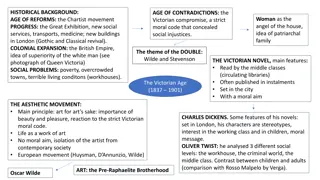
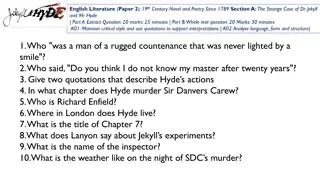

![Negligence Liability in Donoghue v. Stevenson [1932]](/thumb/198881/negligence-liability-in-donoghue-v-stevenson-1932.jpg)


